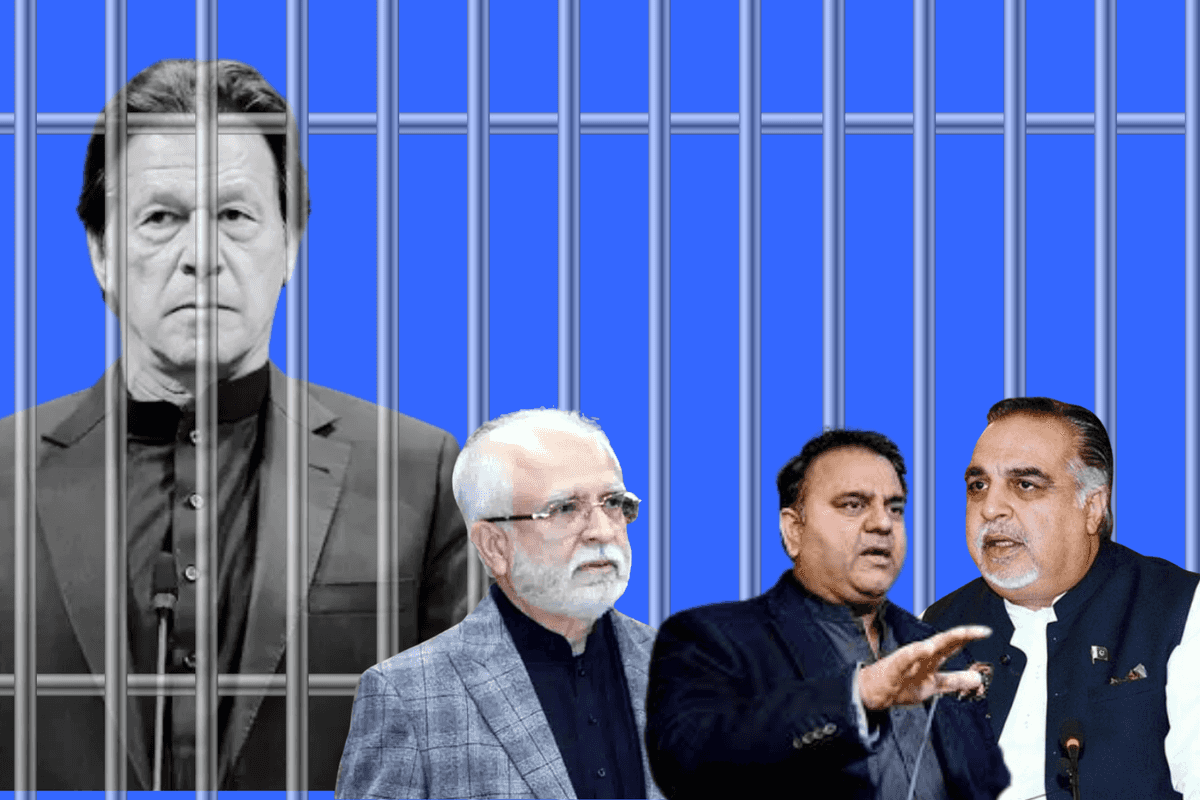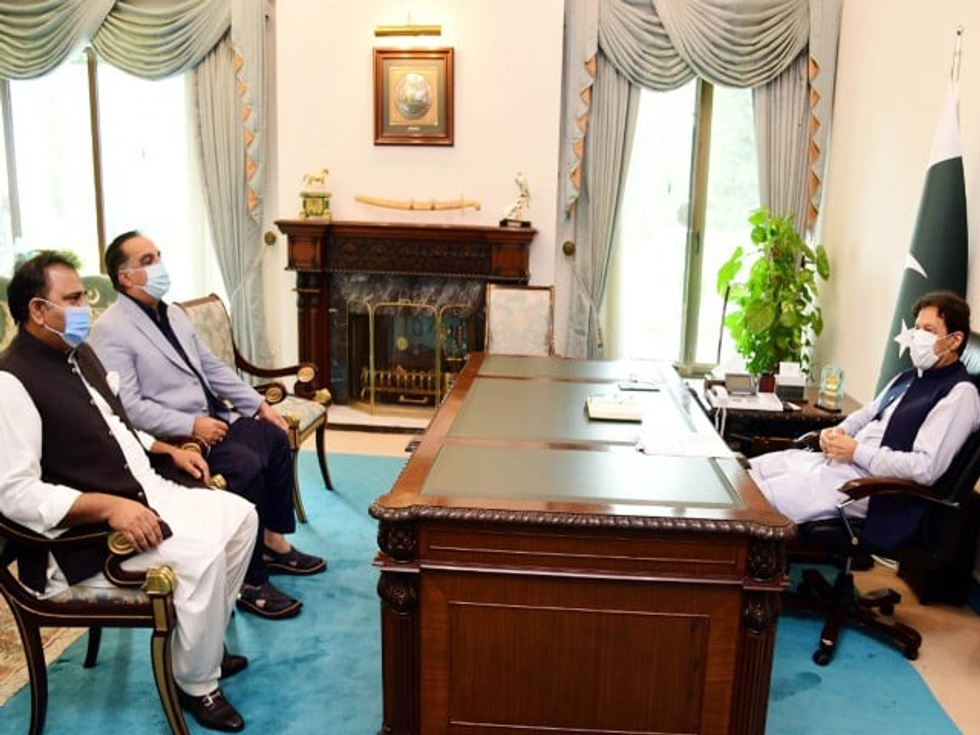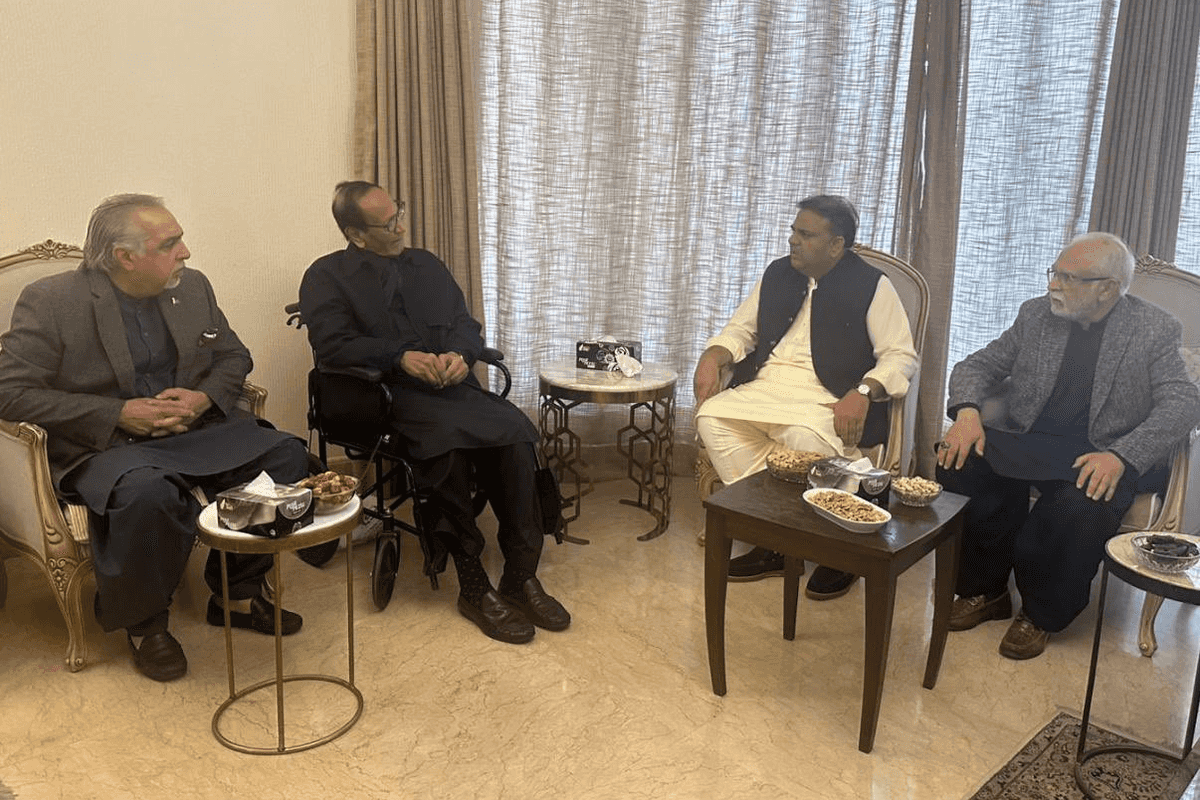Can Imran Khan’s ex-allies find redemption in a campaign for his release?
Analysts say new ‘Release Imran Khan’ campaign’s impact hinges on its ability to reconnect PTI’s jailed leadership with estranged ex-members and gain establishment traction
Azhar Khan
Producer, Karachi Desk
Azhar Khan is a journalist with over 14 years of experience across print, electronic, and predominantly digital media. He has recently held key editorial roles at leading media organizations.

Former PTI leaders Fawad Chaudhry, Imran Ismail and Mehmood Molvi have launched a ‘Release Imran Khan’ campaign seeking his freedom from jail.
Nukta
In Pakistan’s restless political landscape, even silence has started to sound like a strategy. Over three years after Imran Khan’s ouster from power, a handful of his former lieutenants - once symbols of loyalty, now voices of repentance - have launched a campaign calling for the ex-premier’s release.
Their message, framed as an appeal for reconciliation, is testing whether Khan’s Pakistan Tehreek-e-Insaf (PTI), long defined by its populist energy and combative politics, can pivot toward dialogue. But it also exposes the enduring dilemma facing PTI as it tries to balance resistance and relevance in a political system that leaves little room for both.
Ex-allies step forward
The campaign, announced last week by former Sindh governor Imran Ismail alongside ex-information minister Fawad Chaudhry and businessman-turned-politician Mehmood Molvi, insists it is not a betrayal.
Speaking exclusively to Nukta, Imran Ismail explained the rationale behind the initiative. He said PTI has gone through a painful phase, and he doesn’t believe the party has gained anything from confrontation.
“The politics of reconciliation is not in PTI’s ‘gene’” he acknowledged.
When we spoke to friends both inside and outside PTI, they all agreed that we need to sit down and hold talks. A direct clash with the establishment is a path no political party in Pakistan has survived, and PTI is no exception.
Ismail noted that discussions with government ministers and other “important personalities” indicate that talks are possible. “I initially thought the government might be reluctant to resolve matters concerning Imran and PTI, as it could be seen as a direct threat. But in my meetings so far, that hasn’t been the case. I hope this is genuine and not just political posturing,” he said.
- YouTube www.youtube.com
He added that the aim is to make an honest attempt to provide PTI some relief and move both sides toward reconciliation. “Both the PTI and establishment have patriotic people. This is not a Pakistan-India war. If we can successfully lower the temperature and bring both parties to the table, it will be a major achievement. Our utmost effort is to create an environment where talks can happen and some ice can be broken.”

Regarding Imran Khan’s stance, Ismail said, “Imran has released two names recently, which is good. We will hold talks with them to lead the discussions. We will be pleased if our efforts yield results, with people coming to the table. It is ultimately up to Imran Khan who he chooses to send to represent the PTI.”
For these former loyalists, the tone of contrition is new. Ismail admitted that the PTI’s “politics of defiance and endless agitation” had yielded “only shrinking space, arrests, and exhaustion.”
PTI’s fractured ground
Yet the picture on the ground is more complicated.
Reports from Lahore last week described a brief, unannounced visit by the three ex-leaders to Qureshi’s hospital room - a meeting that, according to Qureshi’s aides, ended abruptly when his lawyer was summoned.
PTI insiders, as per the report, later accused the visitors of misrepresenting the encounter as a political consensus. Qureshi’s legal team went so far as to call the episode “deceptive,” saying the former foreign minister “did not even discuss politics” with them.
The confusion points to PTI’s broader disarray - a party fragmented by arrests, defections, and dueling narratives since the violent protests of May 9, 2023, when demonstrators torched government and military installations following Khan’s arrest.
The unrest triggered a sweeping state crackdown, mass detentions, and the exit of nearly all senior PTI figures. Those who left - including Ismail, Molvi, and Chaudhry - cited the chaos and moral exhaustion of those days as their reason to quit.
Are ex-allies acting alone?
Speaking to Nukta, PTI leader Shaukat Yousafzai offered a cautionary perspective, suggesting that some former associates now active in campaigns for Khan’s release may be acting with the establishment's backing.
“That’s my personal view,” he said, noting it remains unclear how effective their efforts will be. “These moves could be part of a strategy by the government or establishment to lower the political temperature ahead of a larger campaign for Khan’s release.”
Since then, the PTI’s leadership has been largely rebuilt by second-tier figures, lawyers, and Khan’s close circle, including his sister Aleema Khan. While Khan’s wife, Bushra Bibi, is said to exert quiet influence, she has avoided the public eye.
Khan himself, imprisoned since 2023 on a series of charges, continues to cast a long shadow over national politics. His followers, numbering in the millions, remain steadfast even as many of their leaders have either been jailed or silenced.
It is this loyalty that makes the “Release Imran Khan” campaign both symbolically potent and politically precarious. The trio behind it argues that reconciliation is now the only viable strategy - not just for the PTI, but for Pakistan’s democracy. “If reconciliation is considered betrayal, so be it,” Ismail wrote on X, insisting their effort is “independent, sincere, and driven purely by conscience.”

Fawad Chaudhry echoed this sentiment in a video message, saying their aim was to “create an environment in which a dialogue could take place.” He suggested that “the political temperature can come down only if PTI takes one step back and the government takes a step forward.”
However, their appeal for dialogue has met skepticism among the PTI’s rank and file, who view any engagement with the establishment as a potential sellout. Many party loyalists still revere Khan’s refusal to compromise, interpreting it as moral courage rather than political obstinacy.
On social media, the reaction to the new campaign has been swift and hostile. Hashtags mocking the ex-leaders as “turncoats” trended within hours of their announcement. “We don’t need saviors who once ran away,” one user wrote, capturing the mood among the faithful.
For others, though, the campaign touches on a more pragmatic truth: the PTI’s politics of confrontation has left it isolated and diminished. With the military-backed government consolidating power and global allies signaling comfort with Pakistan’s current stability, the party’s ability to influence the national agenda has eroded sharply.
“The world sees a strong, stable Pakistan,” Ismail noted, referencing the army chief’s growing diplomatic stature. “That strength comes only through political stability at home.”
Yousafzai added a cautionary note on the establishment’s role, saying that while Imran Khan might be willing to compromise for Pakistan’s sake, any pressure-driven deal would fail.
“If these old associates are acting on official instructions, their real purpose is to create a channel for direct talks with Imran. The outcome will reveal whether the establishment genuinely wants political stability,” he said, stressing that a fair judicial process and release of detainees are essential.
Analysts say the campaign’s effectiveness will depend on whether it can bridge the gulf between the PTI’s jailed leadership and its estranged ex-members, and whether the establishment sees value in engaging with them.
For now, there is little evidence that Islamabad is ready to compromise. Khan remains behind bars, his trials ongoing, while key PTI figures, including Shah Mahmood Qureshi and Yasmin Rashid, continue to face charges over the May 9 unrest.
Dialogue over defiance
What’s clear is that PTI’s confrontation strategy - once seen as a bold stand against Pakistan’s entrenched power structures - has yielded diminishing returns.
From its populist peak in 2022, when Khan’s rallies drew massive crowds, to its current fragmentation, the party has struggled to adapt to a changed political reality. Its internal channels remain clogged by mistrust, with overseas influencers amplifying divisions rather than healing them.
Whether this new reconciliation drive gains traction or fades like previous attempts, it reflects a quiet reckoning among those who once thrived in Khan’s shadow.
“We are thinking from the heart,” Ismail wrote. “For the PTI’s survival and Pakistan’s stability.” It is a rare admission that saving the party may now depend less on defiance and more on dialogue, at least for some.







Comments
See what people are discussing